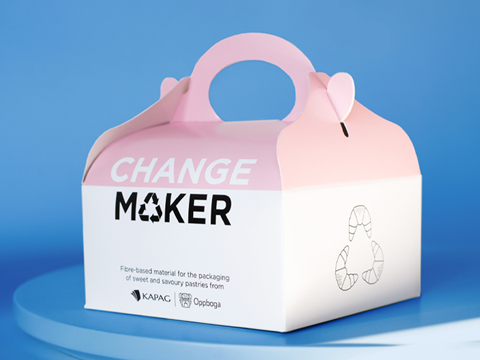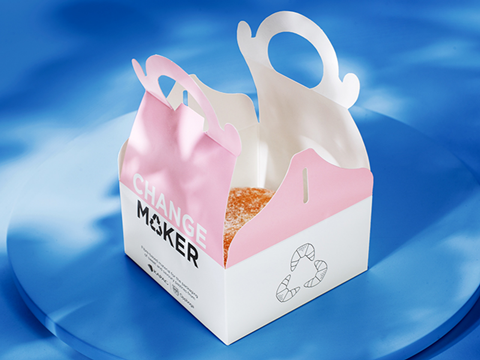
Kapag has combined its lamination process with Sappi’s paperboard (or topliner) and barrier paper to deliver a recyclable mono-material solution for food products, designed to eliminate the need for plastic-based alternatives.
Kapag created the Changemaker brand for all laminated paperboard products that aim to replace or significantly reduce plastics in packaging. First showcased at FachPack, the approach utilizes the company’s lamination process to combine Sappi’s Algro Design paperboard or Fusion Topliner with Sappi’s AvantGuard functional high barrier paper.
While the showcase example at FachPack featured a grease barrier due to the Berliner doughnuts packaged within, Kapag says the same concept can provide protection including oxygen barriers, aroma protection, water vapour barriers and protection against contaminants — while maintaining the printability and converting performance of Sappi’s paperboards.

Sappi’s Algro and Fusion products serve as the visible outer layer with ‘excellent printing and finishing results’ while the AvantGuard barrier papers provide the required functional protection. Kapag’s lamination capabilities include processing materials from reel to reel with widths ranging from 5 cm to 250 cm, and finish to sheet formats up to 360 cm long.
The company adds that this enables the combination of different materials from laminated papers less than 150 microns to a total thickness of 5 mm. The collaboration is also said to open up possibilities across various industries including food, cosmetics, pet food, healthcare, and household products.
Also in paperboard packaging, Graphic Packaging International recently revealed its portfolio of paperboard sushi packaging designed to help foodservice operators meet the requirements of European packaging legislation. Reportedly, all formats can be designed to be recyclable in European household waste streams.
This month Elopak has launched a new paperboard for fresh liquids in chilled distribution chains, said to have a carbon footprint reduction of up to 14% compared to cartons made with standard board. Elopak says the new board offers the same functionality and quality protection as its standard white board but with a dramatic reduction in carbon emissions.
If you liked this story, you might also enjoy:
The ultimate guide to the Packaging and Packaging Waste Regulation in 2025
How are the top brands progressing on packaging sustainability?
Everything you need to know about global packaging sustainability regulation in 2025
The key to increasing the use of reusable packaging in supermarkets














No comments yet